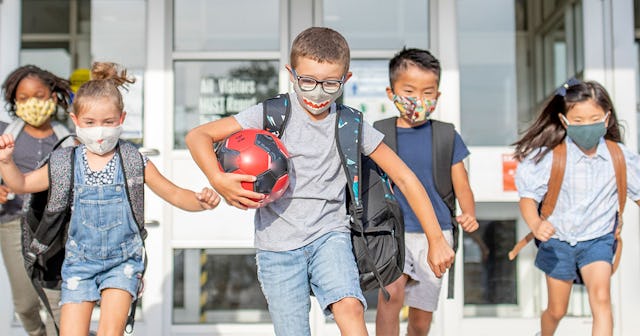From A Teacher: How To Help Our Kids Transition Back Into School Life

“Before you think about retaliating, ask yourself: is this person normally out to get me?”
Sun Tzu on the art of war? General Patton on the rules of engagement? No, just me advising some pre-recess fourth graders on the weeks after winter break.
We forget that this time of year is usually hard for kids for many reasons. From the school perspective, winter break is the second longest break of the year, after summer break. Then they return for a breakneck few weeks before many schools go on break again in early spring — a luxury to be sure, but it’s hard to build what I call social momentum. Social momentum is when kids are seeing their friends frequently, making lots of everyday memories, so no one little conflict or disappointment carries too much weight. When that momentum is interrupted by time off, it takes time to build up again, and can stop-and-start a little awkwardly until it does.
This year, there’s so much more to navigate. School is back in person, masked and distanced. School is back virtually, through a tiny screen. School is suddenly homeschool, with a teacher who never anticipated becoming one. Regardless, this all takes a social toll. Jobs have changed and more people are moving midyear than ever before, which means new schools. New friends. That takes a social toll too. Parents have gotten sick. Teachers have gotten sick. Kids have gotten sick. Everything, every day, feels…up in the air.
Marko Geber/Getty
And all of this uncertainty means that children of every age currently have a massive overabundance of the t-word: TRANSITIONS.
Think about smaller transitions (stopping playing to wash hands, cleaning up for another activity) and larger transitions (being dropped off at school or daycare, going on a trip). Your experience may vary, but most kids’ reactions to the uncertainty of transitions range from disliking them to being thrown into a complete tizzy by them. Some kids become more irritable than usual, grouchier or more prone to losing their temper. Some kids become more sensitive, perceiving that others are being “mean” or “unfair.” Still others may become anxious, in the form of excessive talking or questioning, restlessness or fidgeting. School breaks are like an amplified version of all of this — whether or not kids like school! Teachers get more parent emails focused on social issues in the weeks before and after breaks than any other time of year.
So, what can we, the adults, do about this transitional behavior?
Well, we can’t prevent it. (We also can’t entirely blame it on other people’s children, unfortunately.) But we can talk about it, openly, with our own children, and that can help. A little. Within reason. As with anything in childhood, we can’t speed up development, but we can help kids become better, more self-aware versions of whatever age and stage they’re currently in.
Here are some phrases and questions I’ve found helpful around this time of year, both in the classroom and with my own child. Some are helpful to use proactively, and some in response to issues that may arise. All of these are just starter scripts; they should definitely be adapted to be appropriate for your family.
South_agency/Getty
- Your friends might be having bigger feelings than usual.
- Sometimes, when there are a lot of transitions going on, people can act _____ (unkindly, emotionally, unusually, like buttheads, etc.).
- Take a deep breath and try to keep your cool, even if someone else is having too big of a reaction. You can help de-escalate the situation by being the calm one.
- If your friend is acting in a way you don’t like, before retaliating, ask yourself: is this person normally out to get me? If the answer is yes, tell a teacher. If the answer is no, be like Elsa and LET IT GO. (After you let them know you’d like them to change what they’re doing, of course; you still have rights, even after a break.)
- Choose to be your kindest self while we all get settled back into our routines.
- Things will feel easier when this transition is over, and you can work on your friendship with a fresh set of eyes. (Then prepare to assure anyone under the age of 11 that they will not, in fact, be receiving new eyes.)
Good luck out there. And remember, as Sun Tzu said: “In the midst of chaos, there is also opportunity.” Sounds a lot like life with children, doesn’t it?